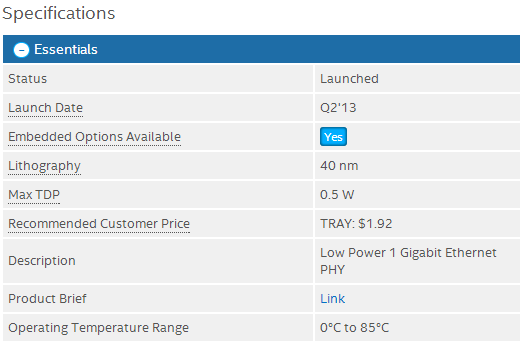Filed under: Investing
There's very little doubt that Intel is the world leader in ramping advanced semiconductor manufacturing processes at good yields well before its primary foundry competition, most notably Taiwan Semiconductor . Even so, a poorly kept secret is that Intel actually builds a good number of chips outside its own factories.
What does Intel build externally?
Take a look at the details of Intel's 2014 and 2015 PC platforms:

Source: VR-Zone China.
The processor and graphics, as well as the platform controller hub, or PCH, are built at Intel's factories. The processor and graphics are typically on the latest and greatest manufacturing technology, while the PCH is usually used to fill older manufacturing plants. However, most -- if not all -- of the remaining chips mentioned in the remainder of this article are built externally.
How do you know that?
If you go to Intel's ARK page -- which is a database of all current and past products -- you can look up some of these products. For example, if you do a search for the Clarksville LAN chip, you'll see the following:

Source: Intel.
Notice how the listing says that the lithography of this chip is 40-nanometer? Intel doesn't have a 40-nanometer process (it has a 45-nanometer process), which means that Intel is building this chip at a third-party foundry, most likely Taiwan Semiconductor.
Intel will begin to move volume to its own factories
Intel's connectivity combos, its cellular modems, and other products are built on similar low-cost, external processes. However, this isn't bad news because this represents volumes that Intel can eventually bring into its own factories. Further, bringing in many of these products presents an opportunity for integration onto its main processors.
In fact, an example is what Intel did with its Atom C2000 micro-server products. The company integrated Ethernet controllers onto the system on a chip, whereas in its other non-SoC server products, the Ethernet controllers are separate and built externally. Logically, it follows that more of Intel's products will integrate this functionality and that eventually these external volumes will be moved internally.

Intel's Avoton integrates Ethernet. Source: Intel via TechReport.
More relevant, though, is that Intel is planning to move its cellular and connectivity assets in-house to integrate them into future mobile system-on-a-chip products. Once this takes place, a pretty significant amount of volume moves away from the foundry landscape and helps to drive more volumes for Intel. It also doesn't hurt that Intel's manufacturing technology is typically ahead of the foundries', which could help differentiate on performance and power.
Foolish bottom line
Intel is undergoing a very interesting transition as it transforms into much more than a PC microprocessor company. Expect over the next several years for Intel to be able to build a wide variety of products on its manufacturing processes. This will not only help drive more volume into Intel's factories, but it will also help Intel become much more flexible in the types of products that it can ultimately build, either for itself or for foundry clients.
Leaked: Apple's next smart device (warning -- it may shock you)
Apple recently recruited a secret-development "dream team" to guarantee that its newest smart device was kept hidden from the public for as long as possible. But the secret is out, and some early viewers are even claiming that its everyday impact could trump the iPod, iPhone, and the iPad. In fact, ABI Research predicts that 485 million of these devices will be sold per year. But one small company makes this gadget possible. And its stock price has nearly unlimited room to run for early in-the-know investors. To be one of them, and to see Apple's newest smart gizmo, just click here!
The article How Intel Corporation Will Build More Chips at Its Factories originally appeared on Fool.com.
Ashraf Eassa owns shares of Intel. The Motley Fool recommends and owns shares of Apple and Intel. Try any of our Foolish newsletter services free for 30 days. We Fools don't all hold the same opinions, but we all believe that considering a diverse range of insights makes us better investors. The Motley Fool has a disclosure policy.Copyright © 1995 - 2014 The Motley Fool, LLC. All rights reserved. The Motley Fool has a disclosure policy.
Read | Permalink | Email this | Linking Blogs | Comments